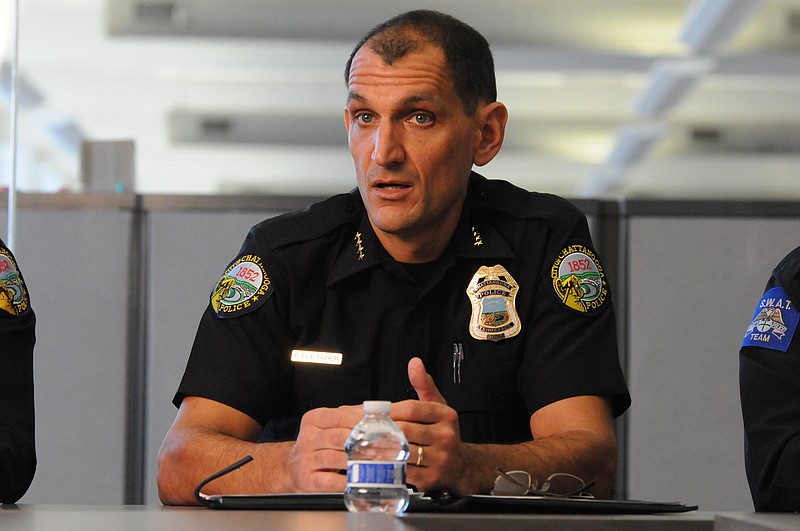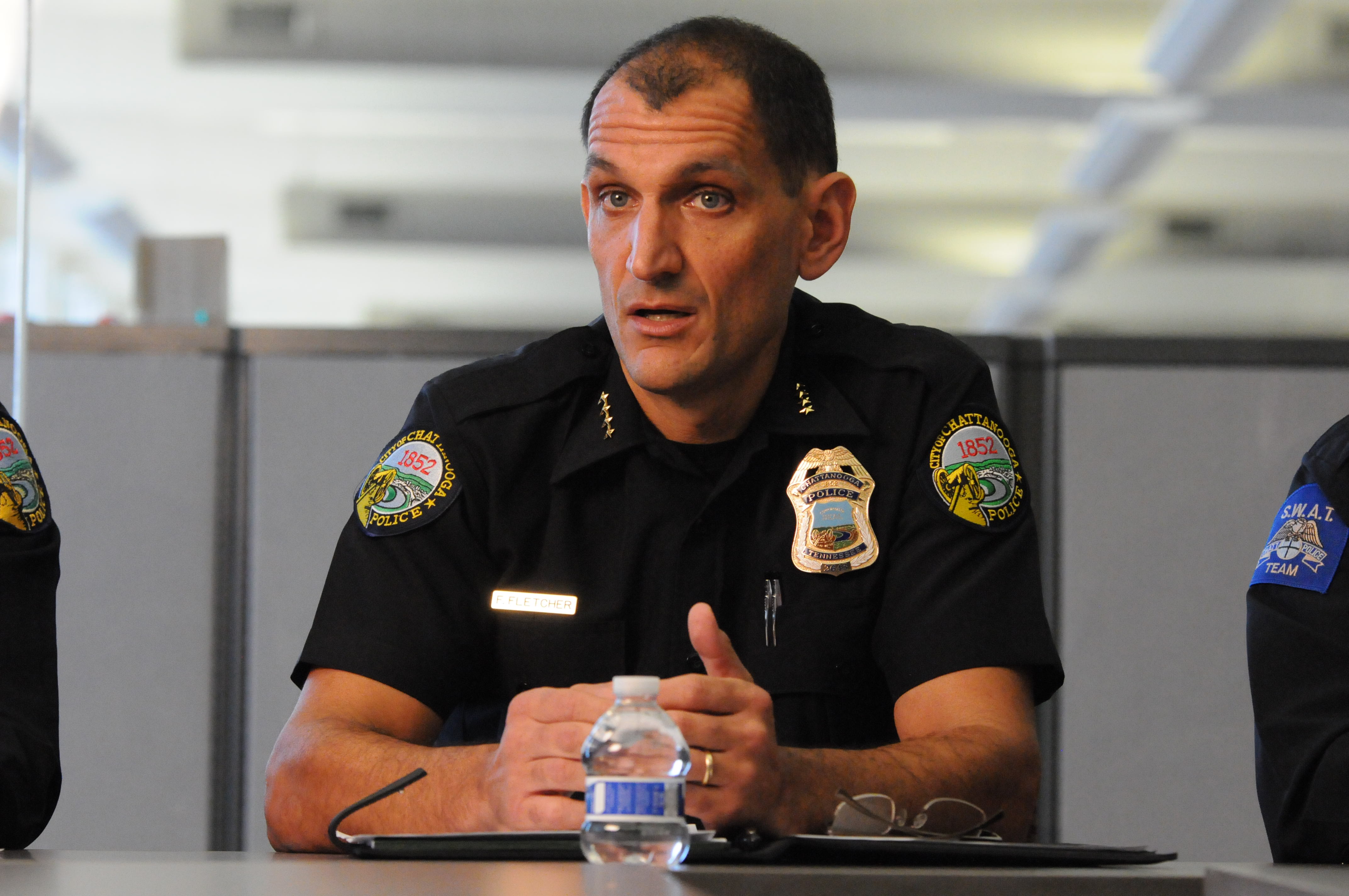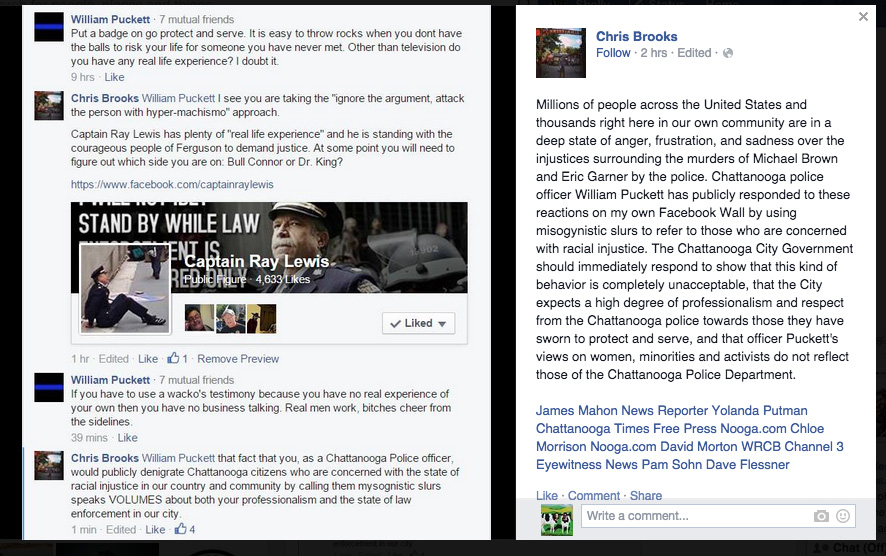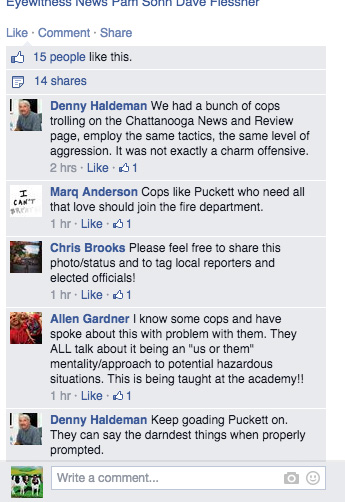CPD UNBECOMING CONDUCT POLICY
1. Employees shall conduct themselves at all times -- both on and off duty -- in such a manner as to reflect favorably on the Department. Conduct unbecoming a public employee includes conduct that is unlawful and/or brings the Department into disrepute, reflects discredit upon the employee as a member of the Department, or impairs the operation or efficiency of the Department or officer. 2. The above conduct includes representations made on and in all forms of social media. Social media includes, but is not limited to, Facebook, Twitter, MySpace and other public or private technologies that may emerge. This would also apply to both public and restricted profiles. Department personnel should assume that their speech and related activity on social media sites will reflect upon their office and this department. Source: Chattanooga Police Department Policy Manual, ADM-16
A public squabble between a local activist and a Chattanooga police officer has sparked an internal affairs investigation and raised concerns among officers about their right to privacy.
The incident started a week ago Thursday when Officer William Puckett and local activist Chris Brooks commented on a Facebook post about racial injustice. Puckett, who has been on the police force since 2002, made two comments that suggested Brooks shouldn't discuss racial injustice because he has never been a police officer.
"Other than television do you have any real life experience?" the officer wrote. "I doubt it."
Later he added, "Real men work, b*****s cheer from the sidelines."
Brooks, one of the founding members of Chattanooga Organized for Action, a nonprofit social justice group, immediately spoke out about the comments, which he called "deeply inappropriate." Brooks is no longer actively involved with Chattanooga Organized for Action. He works as a labor activist.
In the days since, Police Chief Fred Fletcher started an internal affairs investigation into whether Puckett violated CPD's social media policy, a local resident filed a complaint against Puckett, and Brooks submitted an open records request for all of Puckett's text messages from the past two years.
The tiff comes less than three weeks after a grand jury decision in Ferguson, Mo., ignited a national debate about the relationship between police officers and community members, especially among racial minorities.
Much of that debate is unfolding on social media: Officers across the country are defending the need to use force when necessary, while critics are decrying what they call a pattern of police violence against minorities.
In fact, hours before the Ferguson grand jury returned its decision on Nov. 24, Fletcher sent out an email to all officers that urged them to "be mindful" and "deliberate" on social media because officers' comments reflect on the department. And after Puckett's comments surfaced on Dec. 4, Fletcher sent out a second email.
"Let me be clear," he wrote. "We will not tolerate any behavior by a Chattanooga police officer that is abusive, harassing, threatening, profane or otherwise reflects unfavorably on the Chattanooga Police Department."
The department has a social media policy that requires officers to follow codes of conduct even while on social media websites or while off duty. The policy has been on the books since 2013, and Fletcher said he intends to enforce it. The chief even called Brooks directly to discuss Puckett's comments.
"Officers represent the community and the police department and are in a position of trust," Fletcher said in an interview. "I don't think a digital format changes that expectation at all."
But the request for Puckett's text messages, the recent focus on the social media policy and the internal affairs investigations have sparked a heated reaction from officers, who are worried about their rights to free speech and to privacy.
The request for Puckett's text messages struck a particular nerve. Although Puckett texted on his personal cellphone, any texts that are related to doing government business are public records, said Deborah Fisher, executive director of the Tennessee Coalition for Open Government.
Personal texts, however, are not -- so someone has to go through all of Puckett's texts in order to determine which are public and which are private.
"It creates a bit of a quandary," Fisher said. "On one hand, there certainly could be concern if you allow the officer himself to go through those texts and make that judgment call that it would be easy for the officer to withhold something because there is no independent check on him.
"But on the other hand, having an independent government employee go through all of an officer's texts, both personal and business, also seems uncomfortable."
State law says the "records custodian" should go through the records in such a situation, said Ann Butterworth, open records counsel at the Tennessee Comptroller of the Treasury. But the law doesn't define exactly who the records custodian is, she added.
However, state law does imply that the custodian is the government employee who has the records -- in this case, the officer himself. It would be inappropriate, she said, for a third party to go through the texts on the officer's behalf.
Fletcher said he plans to let Puckett go through his own texts and turn over what is public, because while Puckett did receive a stipend from police for his phone, he still owns it.
"It's not my phone," Fletcher said.
Sean O'Brien, president of the Fraternal Order of Police Rock City Lodge 22, said the group's attorney is meeting with the city attorney to discuss the request and the legal opinions.
"We want to honor the law and honor the request, but we also want to make sure we respect any individual's privacy rights," O'Brien said. "We're not trying to contest it; we're trying to balance what the law says with privacy concerns."
He added that FOP has no plans to sift through Puckett's texts and that he hopes to use this experience to better educate officers on open records.
Meanwhile, the reaction to the Puckett-Brooks saga continues online. In one Facebook group devoted to local police and firefighters, some people -- including a current firefighter and former CPD officer -- posted comments that dubbed Brooks a "communist," "d-bag," and "rabble-rousing whiner."
"I think the hostility in response to my publicly calling out a police officer for his comments and filing a complaint has been pretty extreme," Brooks said. "I think it exemplifies an overall cultural problem of police not being accountable to citizens."
A meme of Brooks was also circulated. In the meme, one sentence was superimposed on a picture of Brooks:
"I am Chris Brooks, I preach civil rights for all.....Until I don't agree with your free speech, then I call your employer and try to cause you problems."
Contact staff writer Shelly Bradbury at 423-757-6525 or sbradbury@timesfreepress.com with tips or story ideas.



